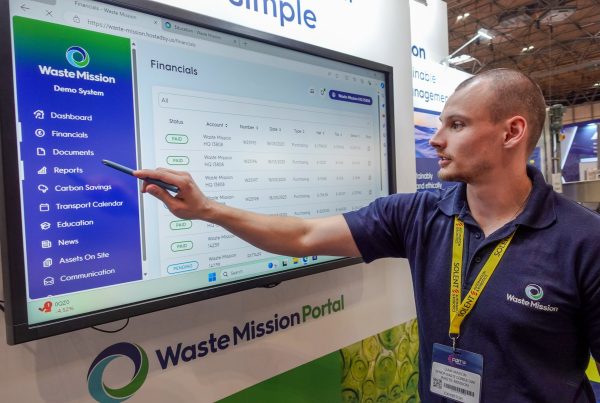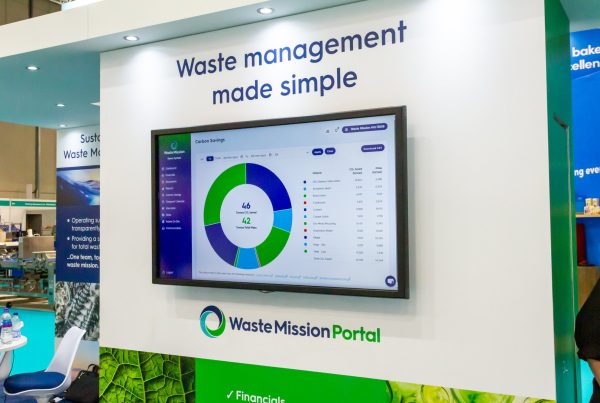Segregating waste into different types can make a huge difference. In 2020, the UK generated an estimated 40.4 million tonnes of commercial and industrial (C&I) waste, which is about one-fifth (21%) of the nation’s total waste generation that year. The task of waste segregation may not seem the most exciting, but it’s an important part of your business operations.
Understanding waste segregation is not about being tidy-minded—it’s about processing your waste responsibly and sustainably and staying on the right side of the law. Given that there are markets for certain types of waste, it could save disposal costs and open up new revenue streams for your company.
We’re here to guide you through the practical steps and benefits of waste segregation, explain the legal requirements, and help you make informed decisions about your waste management.
Waste Segregation in a Nutshell
Put simply, sorting your waste properly means putting different types of waste items into different bins. But, more specifically, it’s about taking a planned approach to stop waste from becoming mixed up and to enable it to be properly processed and recycled.
When you sort your waste properly, your business can feed into reuse and recycling systems that protect the environment and support the economy. As we will see, this can also boost your bottom line.
To give a little insight into the current figures, the UK achieved a 63% recycling rate in packaging (commercial/industrial and household) from 2020 to 2021. After a slight dip to 62.4% in 2022, it climbed to 64.8% in 2023, marking a modest improvement. This shows that progress is being made, but also highlights that there is much more work to do to achieve a 100% diversion from landfill.
Legal Duties for Businesses
Sorting your waste is not an optional extra. There are tight legal requirements on businesses to segregate their waste, and they are becoming tighter.
The Environment Agency can impose civil or criminal sanctions for non-compliance, which could mean stiff financial penalties or even imprisonment.
For example:
Under the Simpler Recycling legislation, as of March 2025, all workplaces (businesses and non-domestic premises) in England have a legal duty to separate out:
- dry recyclable materials – plastic, metal, glass, paper and card
- food waste
- black bin waste (for landfill)
The Waste (England and Wales) Regulations 2011 require businesses to confirm that they have taken all reasonable measures to apply the waste management hierarchy and include a declaration to this effect on their waste transfer or consignment note.
The hierarchy prioritises waste management in the following order:
- preventing waste in the first place
- preparing it for reuse
- recycling
- disposal to landfill
Under the Separation of Waste (England) Regulations 2024, businesses are required to segregate certain types of waste and keep detailed records of the waste they generate, including the type and quantity of waste.
Hazardous waste regulations mandate that dangerous waste, such as batteries and chemicals, be stored and disposed of safely to prevent harm.
Benefits of Proper Waste Segregation
The good news is that segregating your waste has plenty of benefits. It helps protect the environment, supports better health, and keeps your workforce and community safe. Recycling materials can reduce your disposal costs—and even make you money.
Environmental and Health Benefits
Sorting your waste properly helps:
1. Protect the environment by:
- Reducing pollution.
- Saving natural resources and cutting back on the energy and raw materials needed to produce new items, by enabling recycling.
- Reducing the amount of rubbish that goes to landfill. Food waste in landfill produces methane, a powerful greenhouse gas.
2. Protect people's health by:
- Preventing harmful chemicals and elements in hazardous waste from ending up in landfill and contaminating waterways and soil.
- Containing the spread of harmful bacteria and reducing vermin, through safe storage.
Economic Benefits
Effective waste segregation offers substantial economic benefits for businesses by:
- Reducing disposal costs, minimising the volume of waste sent to landfills and thereby decreasing associated taxes and fees.
- Generating additional revenue from saleable recyclables such as paper, metals and plastics.
Different Types of Waste
For good waste management, you’ll need to understand all the different types of waste, such as packaging and recyclables, general rubbish, and dangerous materials, so that each type is handled appropriately.
General waste refers to non-recyclable waste typically sent to landfills or Energy from Waste (EfW) facilities. Effective waste segregation aims to minimise general waste, ensuring as much material as possible is recycled or recovered.
Hazardous waste includes items that might harm people or the environment and that require special handling. Examples include batteries, chemicals and electronic gadgets. Mixing hazardous waste with other waste types isn’t just bad practice – it’s against the law and can pose serious health and environmental risks.
Clinical waste comes from healthcare activities and includes needles, used protective equipment, and other materials that might be infectious or harmful. Strict rules are in place regarding how to store and dispose of clinical waste.
Food waste is an important part of waste segregation because keeping food out of landfill helps reduce greenhouse gases, and allows for recycling and reuse options.
Packaging waste and recyclables include materials such as paper, glass and plastics that can be easily reused or made into new things.
Key Steps to Effective Waste Segregation
Setting up good waste sorting requires clearly labelled, designated bins, staff training and the right storage options to facilitate proper processing.
Here’s a handy checklist:
Label waste containers clearly. Using different, colour-coded labels for each type of waste helps prevent people from putting the wrong item in the wrong place.
Educate and train staff. Regular learning sessions help ensure your team knows how to sort waste properly and prevent mistakes, which could contaminate the sorting process.
Use appropriate storage solutions. Space-saving equipment such as balers and compactors help businesses deal with waste in limited spaces. Tall storage units also make the most of tight spaces, while waterproof bins are important for stopping leaks and spills.
Consider dry mixed recycling (DMR). This approach involves collecting a mix of dry recyclable materials, such as paper, cardboard, plastics, metals, and glass, in a single bin. While DMR is a chargeable service, it remains a convenient and efficient option for businesses looking to streamline their recycling processes while ensuring valuable materials are diverted from landfill.
Use technology to monitor all waste streams, collections, and reporting. Tools such as Waste Mission’s Customer Portal make it easy to monitor collections, licences, compliance, and reporting.
The Impact of Waste Segregation- Recent Case Studies
SRD Engineering
SRD Engineering is a precision engineering company that supplies high-demand industries such as aerospace and automotive (including Formula One). An innovative approach to waste segregation, especially their swarf and the bins, was developed further to increase the financial benefits of recycling for SRD. Throughout their years of partnership with Waste Mission, the team at SRD have seen great benefits to their operations.
Steve Head, Manufacturing Manager at SRD, said, “The biggest benefit I have seen from Waste Mission is their ability to scale up the service offered to suit what we have needed. From changing the swarf containers to make sure they are suitable for new machines, to increasing the collection frequency so we aren't wasting floor space on swarf. We have had advice, and a solution offered to any issues our growth has seen. With the volume of swarf we are now generating, the assistance given has allowed us to maximise the financial returns whilst minimising the time, effort and floor space needed.”
To read the full SRD Engineering case study visit here.
Trouw Nutrition
Trouw Nutrition is a global leader in animal nutrition, providing high-quality feed products, services, and solutions for livestock, aquaculture, and pets.
Trouw Nutrition highly prioritises sustainability, and the team grappled with common issues regarding waste management. Multiple roll-on roll-off containers created site congestion, and a waste system misaligned with sustainability targets presented an opportunity to create a smarter, more efficient approach.
Within six months of partnering with Waste Mission, Trouw Nutrition achieved 100% waste diversion from landfills, and found new revenue in their waste streams. This milestone reflects the effectiveness of a strategic, collaborative approach to waste segregation.
You can read the full case study here.
Summary
Effective waste segregation is essential for proper waste management. This protects the environment, safeguards human health, and conserves resources, supporting the circular economy. It is not an optional extra: the laws on waste segregation, recycling, and disposal are becoming ever tighter.
It all makes good business sense, too. Companies that adopt robust waste management practices can benefit from cost savings, improved operational efficiency, and new revenue streams. At the same time, they will be building a name as a responsible business with strong green credentials.
Partnering with expert waste management services like Waste Mission will help ensure your operations are compliant and efficient. Our tailored approach offers your business the best storage, recycling and collection routines.
Book a waste review with us today to discover how we can help you build a future that’s a few shades greener and streamline your waste management processes from a single point of contact.





